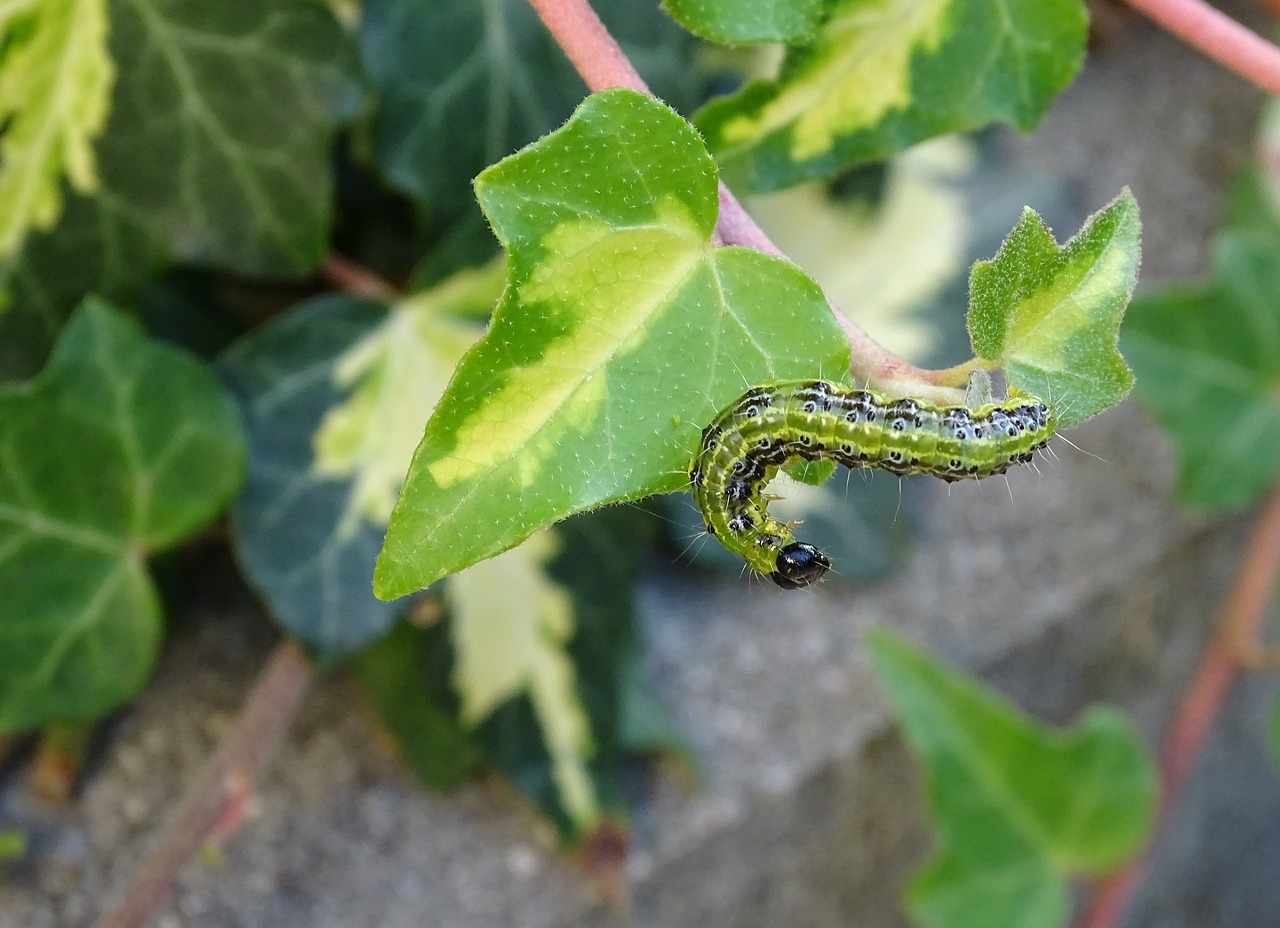Hi @iub2023
Thanks for your question and photos.
Sadly this looks like Box Mother Caterpillar—a voracious nibbler and killer of many a box shrub around the UK.
Box moth caterpillars (Cydalima perspectalis) can cause significant harm to hedges, particularly those made of boxwood (Buxus spp.). You can spot them by the webbing and complete removal of leaves on box hedges.

Here's how they can damage hedges:
Defoliation: Box moth caterpillars feed voraciously on boxwood leaves. As they multiply and infest the hedge, they consume the foliage, resulting in extensive defoliation. The caterpillars can quickly strip the hedge of its leaves, leaving it bare and unsightly.
Weakening of plants: The repeated defoliation caused by box moth caterpillars weakens the boxwood plants. When deprived of their leaves, the plants lose their ability to produce energy through photosynthesis, leading to a reduction in overall plant vigor. Weakened plants become more susceptible to other stressors, such as diseases, pests, and environmental factors.
Dieback and branch death: If box moth caterpillar infestations persist or occur over multiple seasons, the stress on the boxwood plants can lead to dieback and branch death. The plants may fail to recover fully, resulting in gaps and an overall decline in the health and appearance of the hedge.
Webbing and silk nests: Box moth caterpillars produce silken webbing as they feed, which they use to create protective nests or shelters. These nests can cover sections of the hedge, making it unsightly and difficult to access for treatment or pruning.
Spread to neighbouring plants: Box moth caterpillars are highly mobile and can move from one plant to another, including neighbouring hedges or nearby boxwood plants. If uncontrolled, the caterpillars can rapidly spread and infest a larger area, affecting multiple hedges or garden plantings.
To protect hedges from box moth caterpillars, early detection and prompt action are crucial. Regular monitoring of the hedge for signs of caterpillar presence, such as webbing or chewed leaves, allows for you to treat it quicky.
Box moth Control measures may include physical removal of caterpillars if possible but not usually effective or the use of organic or chemical insecticides targeted specifically for box moth caterpillars.
Nematodes that you water into the soil are the best option but once they have started to chew through the box sometimes those parts don't recover. So time is of the essence!
Lastly, maintaining good hedge health through appropriate pruning, watering, and fertilization practices.
https://youtu.be/_Dc3B2I7bu4
I hope that helps!
Lee
Hi @iub2023
Thanks for your question and photos.
Sadly this looks like Box Mother Caterpillar—a voracious nibbler and killer of many a box shrub around the UK.
Box moth caterpillars (Cydalima perspectalis) can cause significant harm to hedges, particularly those made of boxwood (Buxus spp.). You can spot them by the webbing and complete removal of leaves on box hedges.

Here's how they can damage hedges:
Defoliation: Box moth caterpillars feed voraciously on boxwood leaves. As they multiply and infest the hedge, they consume the foliage, resulting in extensive defoliation. The caterpillars can quickly strip the hedge of its leaves, leaving it bare and unsightly.
Weakening of plants: The repeated defoliation caused by box moth caterpillars weakens the boxwood plants. When deprived of their leaves, the plants lose their ability to produce energy through photosynthesis, leading to a reduction in overall plant vigor. Weakened plants become more susceptible to other stressors, such as diseases, pests, and environmental factors.
Dieback and branch death: If box moth caterpillar infestations persist or occur over multiple seasons, the stress on the boxwood plants can lead to dieback and branch death. The plants may fail to recover fully, resulting in gaps and an overall decline in the health and appearance of the hedge.
Webbing and silk nests: Box moth caterpillars produce silken webbing as they feed, which they use to create protective nests or shelters. These nests can cover sections of the hedge, making it unsightly and difficult to access for treatment or pruning.
Spread to neighbouring plants: Box moth caterpillars are highly mobile and can move from one plant to another, including neighbouring hedges or nearby boxwood plants. If uncontrolled, the caterpillars can rapidly spread and infest a larger area, affecting multiple hedges or garden plantings.
To protect hedges from box moth caterpillars, early detection and prompt action are crucial. Regular monitoring of the hedge for signs of caterpillar presence, such as webbing or chewed leaves, allows for you to treat it quicky.
Box moth Control measures may include physical removal of caterpillars if possible but not usually effective or the use of organic or chemical insecticides targeted specifically for box moth caterpillars.
Nematodes that you water into the soil are the best option but once they have started to chew through the box sometimes those parts don't recover. So time is of the essence!
Lastly, maintaining good hedge health through appropriate pruning, watering, and fertilization practices.
I hope that helps!
Lee
 Lee Burkhill: Award Winning Designer & BBC 1's Garden Rescue Presenters Official Blog
Lee Burkhill: Award Winning Designer & BBC 1's Garden Rescue Presenters Official Blog



